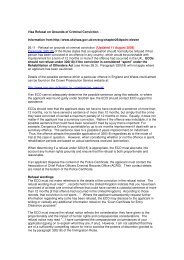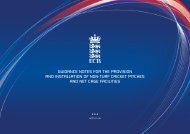Code of Conduct - Ecb
Code of Conduct - Ecb
Code of Conduct - Ecb
- No tags were found...
Create successful ePaper yourself
Turn your PDF publications into a flip-book with our unique Google optimized e-Paper software.
ECB Coaches <strong>Code</strong> <strong>of</strong> <strong>Conduct</strong>Rights/Relationships/ResponsibilitiesIn partnership with
ECB Coaches<strong>Code</strong> <strong>of</strong> <strong>Conduct</strong>Cricket coaches play a crucial role in thedevelopment <strong>of</strong> the game and in the lives <strong>of</strong>the players they coach. Good cricket coachesensure that individuals in cricket have positiveexperiences and are therefore more likely tocontinue in the game and achieve their potential.Coaching, as an emerging pr<strong>of</strong>ession, must demonstrate at all levels, ahigh degree <strong>of</strong> honesty, integrity and competence. The need for cricketcoaches to understand and act on their responsibilities is <strong>of</strong> criticalimportance to the game, as is the concept <strong>of</strong> participation for fun andenjoyment as well as achievement. This is implicit within good coachingpractice and promotes a pr<strong>of</strong>essional image <strong>of</strong> the good practitioner.This <strong>Code</strong> <strong>of</strong> <strong>Conduct</strong> sets out the standards that coaches are requiredto meet.Implementation issuesThis code sets out the standards that coaches are required to meet.It reflects BEST PRACTICE in coaching across the broadestspectrum <strong>of</strong> roles and responsibilities and the ECB recognises thatthe extent to which coaches are required to comply with all thecontent <strong>of</strong> this code may be considered by reference to the nature<strong>of</strong> the coaching role.All coaches holding recognised ECB qualifications are required toabide by this code.This code:• is a constituent part <strong>of</strong> a policy and procedure for dealing withallegations and complaints• is used as the definitive guide and benchmark measure <strong>of</strong> coachingpractice in determining any need for sanctions against a coachGood cricket coaching practiceneeds to reflect the followingkey principles:• RightsCricket coaches must respect andchampion the rights <strong>of</strong> everyindividual to participatein the game.• RelationshipsCricket coaches must develop apr<strong>of</strong>essional relationship withplayers (and others) based onopenness, honesty, mutual trustand respect.• Responsibilities –personal standardsCricket coaches must demonstrateproper personal behaviour andconduct at all times.• Responsibilities –pr<strong>of</strong>essional standardsTo maximise the benefits andminimise the risks to players,coaches must attain a high level <strong>of</strong>competence through appropriatequalifications and a commitment toongoing training that ensures safeand correct practice.• is fully integrated into the cricket and coach education process• is assessed as part <strong>of</strong> the cricket coach accreditation process• is supported by the appropriate training and resources.ECB has developed a training resource that underpins many <strong>of</strong> theconcepts contained within this <strong>Code</strong> <strong>of</strong> <strong>Conduct</strong>. They include theintegration <strong>of</strong> safeguarding throughout the ECB coaching trainingfor both the children’s and young people and adults’ coachingpathways, and the online safeguarding module:• Safeguarding Young Cricketers.2
Principle Statement Issues ActionsRelationshipsCricketcoachesmustdevelop apr<strong>of</strong>essionalrelationshipwith players(and others)based onopenness,honesty,mutual trustand respectCricket coaches:• must not engage in behaviourthat constitutes any form <strong>of</strong>abuse (physical, sexual,emotional, neglect, bullying)• should promote the welfare andbest interests <strong>of</strong> their players• must avoid sexual intimacy withplayers, either while coachingthem or in the period <strong>of</strong> timeimmediately following the end <strong>of</strong>the coaching relationship• must take action if they have aconcern about the behaviour <strong>of</strong>an adult towards a child• should empower players to beresponsible for their owndecisions• should clarify the nature <strong>of</strong> thecoaching services being <strong>of</strong>feredto players• should communicate andcooperate with otherorganisations and individuals inthe best interests <strong>of</strong> players.• Be aware <strong>of</strong> the physical needs <strong>of</strong> players,especially those still growing, and ensure thattraining loads and intensities are appropriate.• Ensure that physical contact is appropriate andnecessary, and is carried out within recommendedguidelines with the player’s full consent andapproval.• Do not engage in any form <strong>of</strong> sexually relatedcontact with an under age player. This is strictlyforbidden as is sexual innuendo, flirting orinappropriate gestures and terms.• Inform parents or guardians immediately if youare at all concerned about the welfare <strong>of</strong>a child.• Discuss with parents and other interested partiesthe potential impact <strong>of</strong> the programme onthe player.• Arrange to transfer a player to another cricketcoach if it is clear that an intimate relationship isdeveloping.• Know and understand the relevant ECB oremployer policies and procedures in this regard.• Follow the reporting procedures laid down byECB or your employer if you have a concern –non-action is unacceptable.• Respect players’ opinions when making decisionsabout their participation in cricket.• Encourage players to take responsibility for theirown development and actions.• Allow players to discuss and participate in thedecision-making process.• Discuss and agree with players what informationis confidential.• Inform players or their parents <strong>of</strong> therequirements <strong>of</strong> cricket.• Inform players or their parents <strong>of</strong> any potentialcosts involved in accessing the coaching serviceson <strong>of</strong>fer.• Be aware <strong>of</strong> and communicate on any conflict <strong>of</strong>interest as soon as it becomes apparent.• Do not work with any other cricket coach’s playerwithout first discussing or agreeing it with boththe coach and the player involved.• Identify and agree with players which otherexperts or organisations could <strong>of</strong>ferappropriate services.3
Principle Statement Issues ActionsPrinciple Statement Issues ActionsRightsCricketcoachesmust respectandchampionthe rights <strong>of</strong>everyindividual toparticipatein cricketCricket coaches should:• assist in the creation <strong>of</strong> anenvironment where everyindividual has the opportunityto participate in cricket• create and maintain anenvironment free <strong>of</strong> fear andharassment• recognise the rights <strong>of</strong> allplayers to be treated asindividuals• recognise the rights <strong>of</strong> playersto confer with other cricketcoaches and experts• promote the concept <strong>of</strong> abalanced lifestyle, supportingthe well-being <strong>of</strong> the playerboth in and out <strong>of</strong> cricket.Principle Statement Issues ActionsResponsibilities– personalstandardsCricketcoachesmustdemonstrateproperpersonalbehaviourand conductat all timesCricket coaches:• must be fair, honest andconsiderate to players andothers in cricket• should project an image <strong>of</strong>health, cleanliness andfunctional efficiency• must be positive role models forplayers at all times.ECB Coach EducationWarwickshire County Cricket GroundEdgbastonBirmingham B5 7QXTel: 0121-440 1748Fax: 0121-446 6344Email: enquiries.coacheducation@ecb.co.uk• Treat all individuals in cricket with respectat all times.• Do not discriminate on the grounds <strong>of</strong>gender, marital status, race, colour,disability, sexuality, age, occupation,religion or political opinion.• Do not condone or allow to gounchallenged any form <strong>of</strong> discrimination.• Do not publicly criticise or engage indemeaning descriptions <strong>of</strong> others.• Be discreet in any conversations aboutplayers, cricket coaches or any otherindividuals.• Communicate with and provide feedbackto players in a manner that reflects respectand care.• Operate within the rules and the spirit <strong>of</strong>cricket.• Educate players on issues relating to theuse <strong>of</strong> performance-enhancing drugs incricket and co-operate fully with UK Sportand ECB policies.• Maintain the same level <strong>of</strong> interest andsupport when a player is sick or injured.• Display high standards in use <strong>of</strong> language,manner, punctuality, preparation andpresentation.• Encourage players to display the samequalities.• Do not smoke, drink alcohol or userecreational drugs before or while coaching.This reflects a negative image and couldcompromise the safety <strong>of</strong> your players.• Display control, respect, dignity andpr<strong>of</strong>essionalism to all involved in cricket.Responsibilities– pr<strong>of</strong>essionalstandardsTo maximisethe benefitsand minimisethe risks toplayers,cricketcoaches mustattain a highlevel <strong>of</strong>competencethroughqualifications,and acommitmentto ongoingtraining thatensuressafe andcorrectpracticeCricket coaches will:• ensure the environment is assafe as possible, taking intoaccount and minimisingpossible risks• promote the execution <strong>of</strong>safe and correct practice• be pr<strong>of</strong>essional and acceptresponsibility for their actions• make a commitment toproviding a quality service totheir players• actively promote the positivebenefits to society <strong>of</strong>participation in cricket• contribute to thedevelopment <strong>of</strong> cricketcoaching as a pr<strong>of</strong>ession byexchanging knowledge andideas with others• gain ECB coachingqualifications appropriateto the level at which theycoach cricket.• Follow the guidelines <strong>of</strong> the ECB or your employer.• Only allow participation if there is no risk tothe player.• Plan all sessions so they meet the needs <strong>of</strong> theplayers and are progressive and appropriate.• Maintain appropriate records <strong>of</strong> your players.• Recognise and accept when it is appropriateto refer a player to another cricket coachor specialist.• Seek to achieve the highest level <strong>of</strong> qualificationavailable.• Attend continuing pr<strong>of</strong>essional development(CPD) to maintain up-to-date knowledge <strong>of</strong>technical developments in cricket.• Attend CPD to maintain up-to-date knowledgeand understanding <strong>of</strong> other issues that mightimpact on both you and your players.• Be aware <strong>of</strong> the social issues and how cricket cancontribute to local, regional or national initiatives.• Actively participate in recruitment and educationopportunities in cricket.• Actively contribute to local, regional andnational initiatives to improve the standards andquality <strong>of</strong> cricket coaching both in cricket andsport in general.• Practise in an open and transparent fashion thatencourages other cricket coaches to contributeto or learn from your knowledge and experience.• Engage in self-analysis and reflection to identifyyour pr<strong>of</strong>essional needs.• Seek CPD opportunities to develop your cricketcoaching skills and update your knowledge.• Manage your lifestyle and cricket coachingcommitments to avoid burnout that might impairyour performance.• Do not assume responsibility for any role forwhich you are not qualified or prepared.• Do not misrepresent your level <strong>of</strong> qualification.www.sportscoachuk.orgAdapted from the sports coach UK <strong>Code</strong> <strong>of</strong> Practice for Sports Coaches with kind permission <strong>of</strong> The National Coaching Foundation. Photos © ECB.Designed and produced by Coachwise Ltd 90858:214



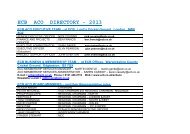
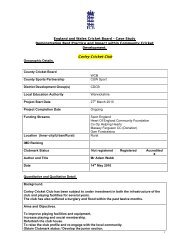
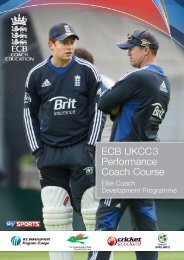

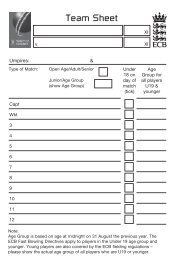
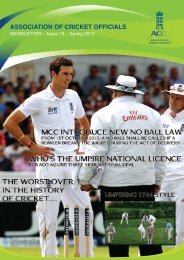
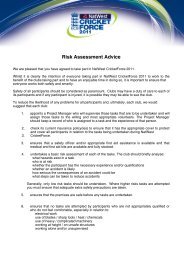
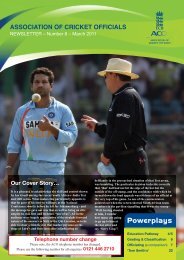

![Indoor Sports Halls with Cricket Provision [TS3] - Ecb - England and ...](https://img.yumpu.com/49070696/1/190x135/indoor-sports-halls-with-cricket-provision-ts3-ecb-england-and-.jpg?quality=85)
